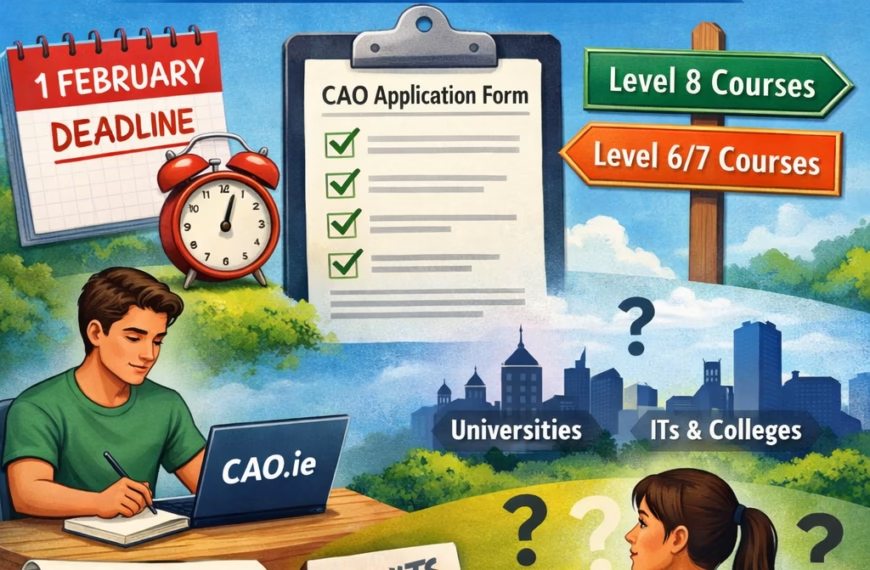There is a little over a month left to the Leaving Cert. There’s no time but too much to do. The mocks feel like they just finished, and the results should have come in. What to do with your results? How to study in the run-up-to the LC? How to get the best possible grade?
I will answer these questions in this article.

In this article, I will first help you identify how to use your mocks as the perfect revision tool. Then, tell you exactly how to revise effectively.
I will tell you what you need to do when answering questions in the exam, how to approach the question, and then what must your answer have.
Then, I will touch on how ot make effective notes during these final revision days, so you will have quick and easy revsion the night before the exam.
Finally, I will go over what your study plan should look like the day, week, and month before the exam.
What should I do with my mock results?
The first thing to do is to understand where you wen’t wrong. Which questions did you get wrong? Were the silly mistakes or are did they examine chapters you don’t understand.
Make a list of these chapters that you didn’t fully get right. These are the weak points, and need fixing. And, the chapters you did get right, that means that you can spend less time on them.
This is the first step on your journey.
What should my study plan be moving forward?
📖 Make a list of all the chapters that need to be done – slowly start ticking them off.
📌 Focus on chapters that you don’t understand. Don’t be afraid to spend mutliple study sessions to nail it down.
⏳Consistent work – Don’t leave stuff for later. Work consistently. Cramming will not work.
✍️ Exam Questions – You need to do as many as possible. Keep 1-2 study sessions a week for PPQs. And do all PPQs for the chapter you are studying.
Articles I need you to read:
To help you with all of this, here are some articles I KNOW you will benefit from:
Can my points increase from the mocks?
The mocks tend to be tougher than the real thing. So, yes, your points in the leaving certificate can drastically increase from the points you got in your mocks.
If you follow a structure, study the right chapters, focus on exam questions, you will definitely get a higher grade.
I know people who got 300 in their mocks, and went up to 600+ in the actual exam. It’s doable, but will require effort from your side.

How to best answer exam questions?
First think about the chapters this question is examining. Once you narrow that down, rephrase the question, and understand what it’s really asking you to do.
Are their any formulas you can use? Is there something you need to analyse first? Then, mentally think about your answer, or the direction you will go.
Here’s what you need to do when answering exam questions:
📚Think what chapters are being examined?
💭 Rephrase the question in your mind – what is it really asking?
📝 Write down any/all formulas you can think are relevant (if it’s a calculation question).
✍️ Start answering the question. And every so often, pause, and read the question again. Make sure you know what it’s asking.
🔍 Look for marks. Are you doing enough to get you the most marks? Are you on the right path?
⏳ Look at the clock? Can you get this question done, or do you need to move on?
If you follow this simple strategy, getting the most amount of marks becomes easy. Of course, this doesn’t work for all questions. For example you wouldn’t do this for a definition.
But this is what I would do for almost all questions in maths. And for most other subjects this is a good place to start.
Should I make notes for my subjects?
Absolutely! You need to make clean and concise notes for each subject. This will be extremely useful when you will be revising for exams.
How to effectively make notes?
📑 Chapter-Specific Notes
- ✏️ Highlight Key Points – Identify the most important concepts, facts, and arguments.
- 📖 Define Key Terms – Write down definitions in simple language for quick recall.
- 📝 Summarize Important Concepts – Explain difficult topics in your own words.
- 🔍 Jot down crucial formulas/theorems
Additional Effective Note-Taking Tips
- 🔄 Review & Revise Regularly – Make it a habit to go over your notes often for long-term retention.
- ⏳ Keep Notes Concise – Avoid copying entire paragraphs; focus on the essence.
- 💭 Add Personal Insights – Relate topics to real-life examples for better understanding.
- ✅ Write Possible Exam Questions – Note down some good ppqs to do for this chapter – and potentially include the answers to these questions too!
Should I take physical or digital notes?
Both physical and digital notes are effective. Physical notes help you stay focused on the content, while digital notes offer better organization and accessibility.

If you have an IPad and are trying to choose the best app for taking notes, here’s my recommendation:
Can I leave chapters out?
My honest answer: try your absolute best to leave nothing. Most LC subjects are shifting to asking questions which examine multiple chapters.
If you leave stuff out, there’s a good chance you’ll be missing out on easy questions, just because the final part is something you haven’t done.
That being said, if you find one chapter to be too difficult and you don’t understand it or understanding it will take too long, then do consider leaving it out. But remember, that will mean you potentially will have less choice in the exam.
How to revise effectively?
Closer to the exams, you should only be revising. Not doing any new content. This is a step-by-step on how I would revise close-to the exams.
How to revise the month before the exams?
By this stage, you should have most of the course done, and should be familiar with it too. If you don’t, it’s fine. Don’t worry. It’s not too late, you can still lock in.
How would you revise the older chapters though? Here’s what I would do:
Go over the chapter you’re studying – look back over the notes you made. This involves reading over the theory and learning definitions. Then, doing as many past paper qs as possible.
What if I don’t have the course done?
Like I said, don’t stress. Revise chapters you already know while learning the new ones too. It’s tricky to do this, but with consistent work you can get it done.
Set aside time each day to learn the new stuff, then time to revise old chapters, and then time for past papers.
Pro tip: Don’t memorise. Learn and understand. That will pay dividends in the long run
How to revise the week before the exams?
At this stage, learning new content is pretty much useless. Just try doing as many exams questions as possible, and look over your notes again and again.
Further refine your concepts.
How to revise the night before the exams?
Don’t overwork yourself. I personally just went over my notes. I literally just read my notes – theory, definitions, answers to questions. I didn’t do any new questions, don’t stres yourself out.
I found it useful to take it easy. I studied a bit, but then I also tried relaxing and just calming down the nerves. Having a fresh mind in the exam is crucial.
H1 guides:
If you have reached this far into the article, it clearly means you care about the Leaving Cert. That’s the most important thing.
To help you, I have made some comprehensive guides on securing the H1 in various subjects. I highly recommend you read them (not because I wrote them, but because they contain what I truly did to get 625 points)
- The ultimate guide to getting 625 points
- How to get a H1 in English (I go in-depth into answering every question from both papers)
- How to get a H1 in Chemistry
- How to get a H1 in Maths
Final words
The LC is fast approaching. This is the time of the year where pressure kicks in, and you get overwhelmed by the sheer amount of stuff that needs to be done.
I’ve been there. I know what it’s like. The feeling of being behind in EVERY subejct is terrible. All I can say, from personal experience, that things do work out if you keep putting in the effort.
In this article I have tried to outline everything you need to do and know before June. Hopefully you found this useful.
I wish you the very best in your preparation, and for June as well!
Post Disclaimer
The information contained in this post is for general information purposes only. The information is provided by How to study in the final days to the Leaving Certificate? and while we endeavour to keep the information up to date and correct, we make no representations or warranties of any kind, express or implied, about the completeness, accuracy, reliability, suitability or availability with respect to the website or the information, products, services, or related graphics contained on the post for any purpose.



